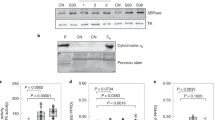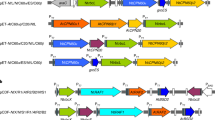Abstract
The balance between photosynthesis and photorespiration in many species, including most crop plants, is determined by the kinetic properties of ribulose-l,5-bisphosphate (RuBP) carboxylase/oxygenase1,2. Photosynthesis is initiated by the carboxylase activity3 while the oxygenase activity catalyses the first reaction in the photorespiratory pathway1,2,4. In these reactions, CO2 and O2 are competitive substrates2. Because O2 inhibits carboxylation, and photorespiration oxidizes reduced carbon to CO2 with no known benefit to the plant, it has been suggested that photosynthetic efficiency and thus productivity might be increased by chemical or genetic alterations of the enzyme which increase carboxylation or decrease oxygenation5–7. On the other hand, it has been argued that RuBP carboxylase/oxygenase cannot completely discriminate between CO2 and O2, so that photorespiration is unavoidable8. From analyses of RuBP carboxylase/oxygenase enzymes purified from several different species, we report here large differences in specificity towards the substrates CO2 and O2. Evolutionary pressures seem to have directed the enzyme towards more efficient utilization of CO2.
This is a preview of subscription content, access via your institution
Access options
Subscribe to this journal
Receive 51 print issues and online access
$199.00 per year
only $3.90 per issue
Buy this article
- Purchase on Springer Link
- Instant access to full article PDF
Prices may be subject to local taxes which are calculated during checkout
Similar content being viewed by others
References
Ogren, W. L. & Bowes, G. Nature new Biol. 230, 159–160 (1971).
Laing, W. A., Ogren, W. L. & Hageman, R. H. Pl. Physiol. 54, 678–685 (1974).
Weissbach, A., Horecker, B. L. & Hurwitz, J. J. biol Chem. 218, 795–810 (1956).
Bowes, G., Ogren, W. L. & Hageman, R. H. Biochem. biophys. Res. Commun. 45, 716–722 (1971).
Chollet, R. & Ogren, W. L. Bot. Rev. 41, 137–179 (1975).
Ogren, W. L. in Proc. 4th int. Congr. on Photosynthesis (eds Hall, D. O., Coombs, J. & Goodwin, T. W.) 721–733 (The Biochemical Society, London, 1978).
Somerville, C. R. & Ogren, W. L. Proc. natn. Acad. Sci. U.S.A. 77, 2684–2687 (1980).
Lorimer, G. H. & Andrews, T. J. Nature 243, 359–360 (1973); FEBS Lett. 90, 1–9 (1978).
Jordan, D. B. & Ogren, W. L. Pl. Physiol. 67, 237–245 (1981).
Gibson, J. L. & Tabita, F. R. J. biol. Chem. 252, 943–949 (1977).
Cloud, P. E. Science 160, 729–736 (1968).
Badger, M. R., Kaplan, A. & Berry, J. A. Yb. Carnegie Instn Wash. 77, 251–261 (1978).
Hatch, M. D. Biochem. J. 125, 425–432 (1971).
Smith, B. N. & Robbins, M. J. in Proc. 3rd int. Congr. on Photosynthesis (ed. Avron, M.) 1579–1587 (Elsevier, Amsterdam, 1975).
Yeoh, H.-H., Badger, M. R. & Watson, L. Pl. Physiol. 66, 1110–1112 (1980).
Author information
Authors and Affiliations
Rights and permissions
About this article
Cite this article
Jordan, D., Ogren, W. Species variation in the specificity of ribulose biphosphate carboxylase/oxygenase. Nature 291, 513–515 (1981). https://doi.org/10.1038/291513a0
Received:
Accepted:
Issue Date:
DOI: https://doi.org/10.1038/291513a0
This article is cited by
-
Equisetum praealtum and E. hyemale have abundant Rubisco with a high catalytic turnover rate and low CO2 affinity
Journal of Plant Research (2024)
-
Role of carbon-dioxide sequestering bacteria for clean air environment and prospective production of biomaterials: a sustainable approach
Environmental Science and Pollution Research (2022)
-
Oxygen response of leaf CO2 compensation points used to determine Rubisco specificity factors of gymnosperm species
Journal of Plant Research (2020)
-
Photoprotection mechanisms under different CO2 regimes during photosynthesis in a green alga Chlorella variabilis
Photosynthesis Research (2020)
-
Oxygen: the universal currency on coral reefs
Coral Reefs (2019)
Comments
By submitting a comment you agree to abide by our Terms and Community Guidelines. If you find something abusive or that does not comply with our terms or guidelines please flag it as inappropriate.



